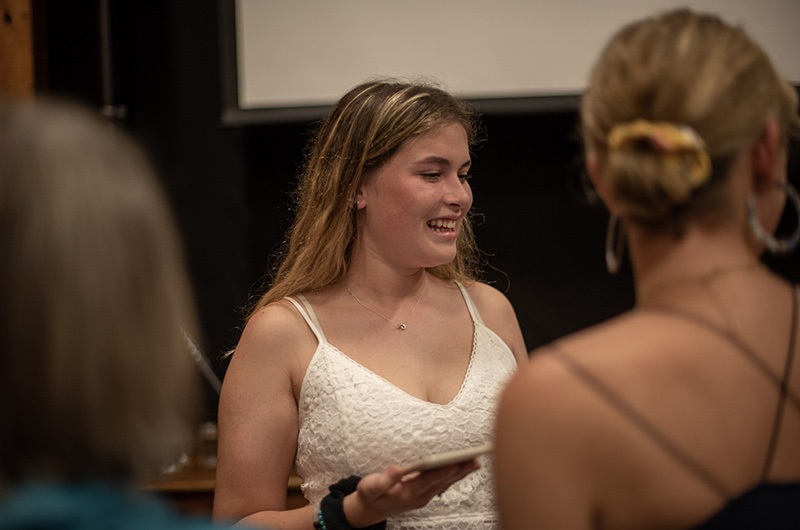Screams, sobs, gunshots and a terrified whisper—for a few moments Monday night an Island audience heard the sounds of Marjory Stoneman Douglas High School under fire.
The documentary After Parkland, which follows several young survivors and the families of two victims of the Feb. 14, 2018 massacre, screened at the Chilmark Community Center as part of the Martha’s Vineyard Film Festival summer series. After the film, audience members took part in a 40-minute conversation with two 15-year-old survivors of the attack in Parkland, Fla., carried out by a former student who killed 17 people and wounded 17 more with a legally-purchased, semi-automatic AR-15 rifle.
The students’ mothers, the film’s two directors and one of its producers were also on the panel of speakers, moderated by film festival executive director Hilary Dreyer.
Ninth-grader Brooke Harrison brought Valentines to school in her backpack that day. But instead of handing them out to her friends after class, she watched the gunman pick off her friends in their seats—one in front of her, one to the side, one behind.
In the documentary, directed by Emily Taguchi and Jake Lefferman, Ms. Harrison appears stoic as she describes the events for the camera, talks with her mother at home and prepares to return to school two weeks after the shooting. But both she and her mother, Denise, told the Chilmark audience that they wished they could have shown more of the emotion they were feeling, and still feel.
“I put up a front,” Brooke Harrison said. “It was easier.”
Denise Harrison fought tears as she recalled retrieving her daughter’s backpack, still filled with Valentines, and discovering it was pierced by a bullet hole.
Unable to forget what she witnessed, including the death of her best friend, Brooke Harrison has embraced public speaking. “Anywhere that they’ll have me,” she said.
Her message: Students in school need to be, and feel, safer.
“I share my story so that people in school, and especially students, don’t have to go through anything that I went through—and really to make them enraged, to make them upset, make them empowered so that they want to also participate in all the things that we’re doing,” she told the audience.
Rage, like that felt in Parkland when the shooter proved to have had a long and troubling record of violent and threatening behavior, can be useful, Brooke Harrison added. “Any time you can channel that anger and rage into something good, I say do it,” she told the applauding audience.
Classmate Lauren Hogg, like her older brother David Hogg, quickly became active in the March for Our Lives gun-control movement founded by Parkland survivors.
“In the film, I don’t even talk,” Ms. Hogg said in Chilmark. “I was just so exhausted...I spent all day, all night on the phone with so many different people just organizing [the march].”
She, too, expressed regret that she had not been more emotionally available for the filmmakers. “I wish I would have been able to have the energy,” she said.
March for Our Lives has been active in the 17 months since the Parkland shooting—one of 24 school shootings in 2018 that in total killed 35 students and seven adults and injured another 79 people. The audience shuddered as Ms. Hogg described her first efforts lobbying for gun control in Washington, where lawmakers and their staff barely acknowledged her.
“I was so frustrated being treated as so much less because I was young and because I was female,” she said.
In desperation she said she shifted one of her rings to her ring finger so people would think she was older and married and stopped telling people she was from Parkland. “I thought I would be taken more seriously, and I was. That’s the terrifying thing.”
“That really shows how much work there is to be done, how important it is for females to be in these circles, at these tables. Not really going to the table, but creating your own table,” she added, to loud applause.
The Hoggs may have inherited their activism from their mother, Rebecca Boldrick, who took them to protests when they were small.
“I was arrested for protesting apartheid in the 80s,” Ms. Boldrick said. “It just comes naturally to me...I do feel I’m able to enact change myself, and through my views I’ve influenced my children.”
Her son and daughter, with their fellow activists, have been attacked on social media and by some commentators, but opposition to March for Our Lives’ gun-control mission doesn’t bother her, Ms. Boldrick said in Chilmark.

“If people come after my family, instead of backing down, it makes me madder,” she said. “It doesn’t at all discourage me.
“It does kind of worry my husband sometimes. ‘There she goes again!’” she added, sharing a laugh with the audience.
At the end of the summer, Ms. Harrison and Ms. Hogg will start their junior year at Parkland.
“Every single day we still have to go into school and walk past the building where our friends were murdered and that’s so, so difficult...just trying to live normal life and go to a place that should be a safe haven and a place to learn,” Ms. Hogg said. “I’m doing Algebra II, look out the window and see the building where my friends were murdered.”
Both said that school officials have done a poor job of assisting survivors, two of whom committed suicide this year. No suicide prevention program was in place before the two deaths, Ms. Harrison said.
Ms. Hogg added that school counselors were not trained to help students with trauma and that when she had a panic attack after a fire alarm went off, she was turned away for lack of an appointment.
The best thing, she said, was the service dogs—14 trained therapy dogs that visited the school to comfort students and staff. The pets became so popular, they have their own page in the Marjory Stoneman Douglas yearbook.
But, Ms. Harrison said, “they’re taking them away this year.”
Jeanmarie Condon, one of the film’s producers, praised the students and families for their openness so soon after the shooting.
“A great documentary doesn’t just come because the filmmaker’s great or because the subject is great,” she said. “It comes because very sensitive filmmakers end up in a room with subjects that are willing to just basically open their veins.”
Asked what audience members can do to support the Parkland survivors, both young women had ready answers.
“Any way you can make your voices heard and do anything to support our cause—whether it’s sharing a photo, retweeting something, showing up at marches—anything that you can do, do it, because you’re a part of making that change,” Ms. Harrison said. “Really, anything helps to get that word out, so do as much as you can, as much as you’re willing to do.”
Ms. Hogg asked audience members to vote—and to make sure their adult children vote as well.
“Drag your friends to vote. Offer to take care of people’s kids who can’t afford it so they can go out and vote,” she said.
The other most important thing people can do, Ms. Hogg said, is to “continue the conversation.”
“If any of you leave here today and you don’t talk about what you saw, you have failed us and we have failed you,” she said.









Comments
Comment policy »